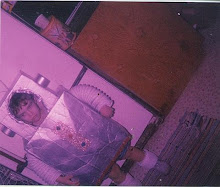What is it about photographs that makes them so fascinating. I think, for me at least, they're a way of rendering a moment—a single moment—forever. The subject of the photo, in the moment that it's taken, will never exist again. The light will never be the same, the branches of the tree will never be the same, the expression in a face. A photo preserves something otherwise ephemeral and imparts a simple object with profundity.
A good example of that aesthetic is William Eggleston, who I think I'm willing to call my favorite photographer. His images are, on the surface, so simple, but there is a strange, implied tension. When you look at one of his photographs, you feel as if you just missed some incredible revelation. Critics can say that Eggleston's photos are mundane, that anyone could take them, but those are the same people who decry Jackson Pollock or Piet Mondrian. If anyone thinks Eggleston's photos or Pollock's artwork is so easy, they should try replicating it. They'll undoubtedly find it a lot more difficult than they think.
I love democracy in my art, whether it be Walt Whitman or Carl Sandburg or Robert Frank. That dedication to democracy—no one image is more important than another, all things are equally valid subjects for photography—is what I love most about Eggleston. He takes the banal and creates something sublime of it.
Photography is, like a few other pursuits I enjoy, something I feel I have some talent for, but I lack the discipline to perfect. And when I started taking pictures, without my realizing it, I was ripping Eggleston off. Not because I'd seen his work, or even knew who he was, but simply because his influence was so prevalent. I had the same experience when I discovered the Beats and realized that my own writing was similar to theirs due entirely to the fundamental nature of their work. The same way any American teenager who picks up a guitar and starts playing rock and roll songs is going to, whether they know it or not, owe something to Robert Johnson and Hank Williams and Chuck Berry.
Still, it's hard to shake the feeling of remarkable synchronicity. Imagine the feeling I had when I saw these Eggleston photos, compared to my own pictures, taken years ago with that old Pentax:




It was like meeting a kindred spirit.

No comments:
Post a Comment